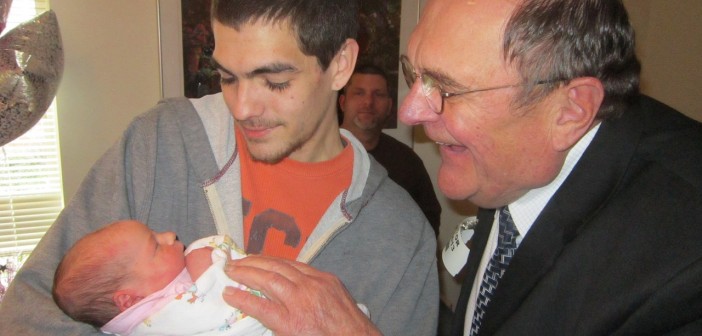Church leaders typically consider it a liability when they are unable to provide focused age-specific ministry to every demographic in the congregation. But in large and thoroughly age-segregated churches where the generations seldom interact, children and youth can move through the church without ever being integrated into congregational life in any meaningful way. They go from the nursery to children’s church and from children’s church to youth group. Then, after they graduate from high school, many of them head off to college where they don’t know how to look for a worshiping community.
When circumstances dictate that younger people rub shoulders with people in different life stages, wonderful things can happen.
In a church of 2,000 members, it is easy enough for teenagers to spend their time exclusively with teenagers, young parents to congregate only with other young parents, and older couples to gravitate toward other older couples. In a smaller church, however, this is nearly impossible. In a smaller church, everyone is more naturally aware of everyone else. If a teenage boy enjoys working with younger children, some will undoubtedly find out and encourage the teen to volunteer in the nursery or a children’s outreach. If a young woman plays guitar, she is likely to be called upon to help with worship now and again. And when circumstances dictate that younger people rub shoulders with people in different life stages, wonderful things can happen.
As many churches are discovering, people of all ages benefit from the congregation’s functioning as a family, particularly as people become more transient and move geographically farther from their biological families. And ongoing research suggests that intergenerational ministry may be the key to ensuring that our teens remain committed to the community of saints. Researcher and youth pastor Kara Powell maintains “There is a strong link between kids’ involvement in intergenerational relationships and worship and their staying in church after they graduate.” She insists that the smallest of steps toward intergenerational relationships within the church can make a significant difference.
The small-membership church is the ideal place for these important relationships to occur. Larger churches must hire new staff persons to accomplish what the small church can do with ease: take the radical step of recognizing that the church exists not only to serve the family, but ultimately to serve as family.
Of course, a church can’t claim to have embraced intergenerational ministry simply because it has members of several generations sitting in the same room on a Sunday morning. A church can be without age-specific programs and still fail to engage its youth and children. Ultimately, the onus for the success of intergenerational ministry rests on the older members of the congregation. They must embrace their potential as mentors, as functional parents and grandparents. But I am convinced that if the small church had no other inherent value, no other particular strength, this one thing would make it a strategic tool for the future of the Christian faith.
This article is adapted from Brandon’s book The Strategically Small Church, Bethany House Publishers, a division of Baker Publishing Group, 2010, and used by permission. The Strategically Small Church is available at Amazon and Cokesbury.
Related Resources:
- The Soul of a Small Church by Lew Parks
- A Better Script for Small Churches by Lew Parks
- Doing Community Ministry in the Small Church by Joy F. Skjegstad







